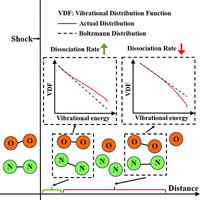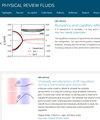修正了氧气和氮气的非波尔兹曼效应的改进型双温模型
IF 2.5
3区 物理与天体物理
Q2 PHYSICS, FLUIDS & PLASMAS
引用次数: 0
摘要
在热化学非平衡过程中,不同种类分子内能之间的非平衡和非波尔兹曼(NB)能态分布都会对解离速率系数产生重大影响。传统的双温(2-T)模型无法准确描述这些效应,尤其是非玻尔兹曼效应。因此,2-T 模型计算出的解离速率系数在模拟强热化学非平衡流动时并不准确,导致表面热通量与实验数据不一致。本文利用状态对状态(STS)方法研究了 N2 和 O2 零维加热过程中 NB 效应对解离速率系数的影响因素。在此基础上,我们建立了一个拟合公式来精确修正 NB 效应。此外,我们还提出了一个改进模型,将该拟合公式与单组线性最大熵模型相结合,该模型只考虑了不同种类内能之间的非平衡效应。这一改进模型准确地描述了热化学非平衡对解离速率系数的影响。为了验证改进模型的有效性,我们模拟了正常冲击后的非平衡过程。结果表明,在强热化学非平衡流动中,与 2-T Park 模型相比,改进模型计算的平移温度与 STS 方法计算的平移温度之间的最大差异和平均差异分别减少了 68% 和 82% 以上。此外,计算结果与实验数据非常吻合,表明改进模型能够准确描述热非平衡态对解离速率系数的影响。本文章由计算机程序翻译,如有差异,请以英文原文为准。

Improved two-temperature model with correction of non-Boltzmann effect for oxygen and nitrogen
In thermochemical nonequilibrium processes, both the nonequilibrium between different kinds of internal energy of molecules and the non-Boltzmann (NB) energy state distribution significantly impact the dissociation rate coefficients. The conventional two-temperature (2-T) model fails to accurately portray these effects, especially the NB effect. Consequently, dissociation rate coefficients calculated by the 2-T model are inaccurate in simulating strong thermochemical nonequilibrium flow, resulting in a surface heat flux inconsistent with experimental data. This article investigates the influencing factor of the NB effect on the dissociation rate coefficient using the state-to-state (STS) method during the zero-dimensional heating process of and . Based on this, we develop a fitting formula to precisely correct the NB effect. Furthermore, we propose an improved model by integrating this fitting formula with the single-group linear maximum entropy model, which considers only the effect of nonequilibrium between different kinds of internal energy. This improved model provides an accurate description of thermochemical nonequilibrium on the dissociation rate coefficients. To validate the effectiveness of the improved model, we simulate the nonequilibrium process following a normal shock. The results demonstrate that in strong thermochemical nonequilibrium flow, compared to the 2-T Park model, the maximum and average discrepancies between the translation temperatures calculated by the improved model and those by the STS method are reduced by more than 68% and 82%, respectively. Additionally, the results closely align with experimental data, indicating that the improved model can accurately depict the effect of thermal nonequilibrium on dissociation rate coefficients.
求助全文
通过发布文献求助,成功后即可免费获取论文全文。
去求助
来源期刊

Physical Review Fluids
Chemical Engineering-Fluid Flow and Transfer Processes
CiteScore
5.10
自引率
11.10%
发文量
488
期刊介绍:
Physical Review Fluids is APS’s newest online-only journal dedicated to publishing innovative research that will significantly advance the fundamental understanding of fluid dynamics. Physical Review Fluids expands the scope of the APS journals to include additional areas of fluid dynamics research, complements the existing Physical Review collection, and maintains the same quality and reputation that authors and subscribers expect from APS. The journal is published with the endorsement of the APS Division of Fluid Dynamics.
 求助内容:
求助内容: 应助结果提醒方式:
应助结果提醒方式:


